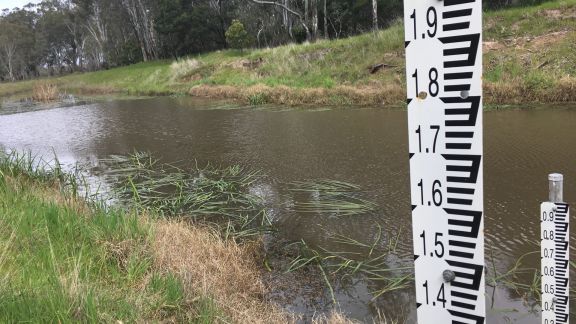How maths is solving complex water quality issues
19 June 2020

Researchers are using complex mathematical modelling to improve the quality and distribution of water, a vital and precious resource that is often taken for granted because of its ‘simple’ journey from reservoir to tap.
Federation University Australia has a long-standing relationship with Grampians Wimmera Mallee Water (GWMWater), initially collaborating to improve the efficiency of the Wimmera Mallee Pipeline – a system well over 8,000 kilometres in length that supplies a large rural area of north-west Victoria and was built to replace an ageing and inefficient open channel water delivery system.
Professor Adil Baghirov, from the School of Engineering, IT and Physical Sciences, said researchers developed new algorithms and optimization techniques to reduce energy consumption and pumping costs, and to improve water quality to customers. The research contributed to a 20 per cent reduction in bills for households, businesses, industry and farmers. It also provided a more secure and efficient supply, with lower carbon emissions.
“This project was about making the distribution of water more efficient and better serving customers, addressing their concerns and their demand,” Professor Baghirov said.
“But at the same time we wanted to minimise the pumping costs and improve the quality of the water.”
Key to the project was developing a mathematical model based on optimization where water with varying degrees of quality was taken from different reservoirs in the Grampians region and mixed within the pipework to satisfy usage requirements for urban, farming and industrial use.
“We adapted the model to make it more complete and include all possible objectives. In many situations, chlorine is used to address the problem of the poor quality of water but in the Grampians, the water was mixed from different sources, because in some lakes the water quality is good, in others not so good. When you mix it you can achieve something that meets all the quality requirements,” Professor Baghirov said.
“But pumping water from these sources and mixing it inside pipes is adding another cost, so our model – which we refer to as a multiple objective optimization model – achieved this and attracted a lot of attention from countries in Europe as well as China, India and Pakistan, and it was published in highly ranked international journals.” Professor Adil Baghirov
The project was also recognised by the Australian Research Council as having high impact and the research helped motivate a state-wide change in the Victorian water industry to implement ‘intelligent water networks’ and look for more efficient ways to operate pipeline systems.

Work continues, with the sector undertaking research on water grids, water resources and climate change, and optimization of complex systems.
This includes more modelling in an industry project led by Associate Professor Andrew Barton and PhD candidate Sayani Dey which is looking at the problem of optimising water quality in complex multi-reservoir systems.
“You have demands from customers in urban areas as well as those in agriculture and industry. This needs to be matched with the water that is available across several reservoirs, each of different water quality, and so the problem can become very complicated,” Professor Baghirov said.
“There are many reservoirs in the Grampians, many different stakeholders, many issues around water quality, water security and climate change, and there are many problems that mathematical modelling can help solve.”


